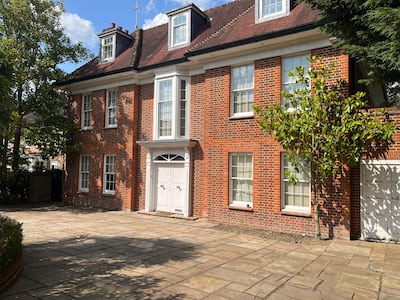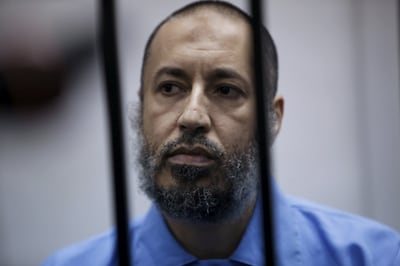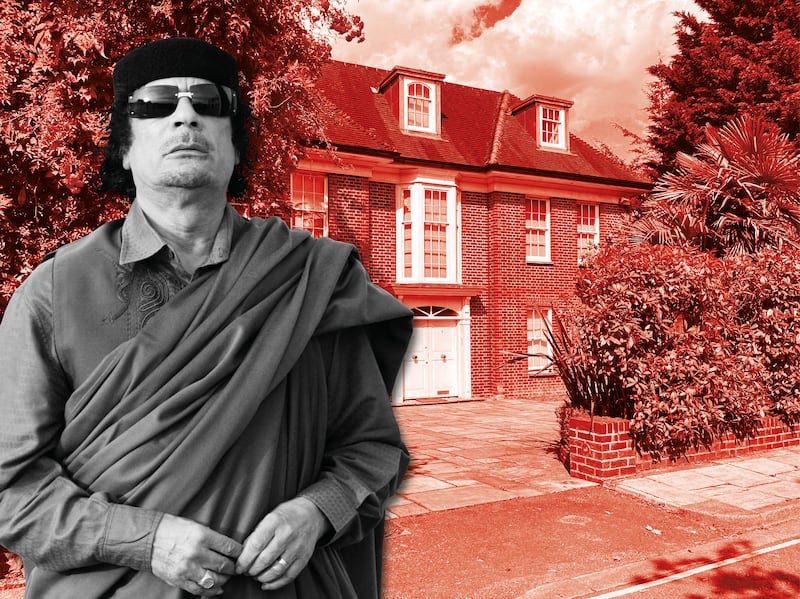A US arms manufacturer is entitled to the proceeds from any sale of a London property once owned by the Qaddafi family, a judge has ruled.
The £9 million property, a once plush but now rotting mansion in Hampstead – an upmarket north London district favoured by international investors – has been at the centre of a legal tug of war between the manufacturer, General Dynamics, and the state of Libya for more than a decade.
It was owned by Saadi Qaddafi, former commander of Libya's special forces and a son of the former leader Muammar Qaddafi.
Libya seized the property in 2012, a year after the regime was overthrown, and heralded it as the start of an assault to retrieve up to $200 billion in overseas assets looted by the Qaddafis.
General Dynamics, which makes the F-16 fighter jet and M1 Abrams tank, wants the house to be sold so it can recoup some of the £16 million ($20.34 million) it is still owed for the supply of communications equipment to Libya.
After several court bids to secure payment for the debt, it has now been granted what is known as a final charging order on the property.
An attempt by Libya to claim it was exempt from the legal action due to state immunity was dismissed by the judge at the High Court in London.
If the property is ever sold, then Libya must repay the company the proceeds.
However, if General Dynamics wants to force a sale it must apply to a court for a further order.

Who gets Qaddafis' riches?
A 2016 study by consultants for anti-corruption group Transparency International suggested that $60 billion to $120 billion had been looted by former regime officials.
Only $20 million of that was returned to Libya and half of that was the London property.
It was seized in the name of the Libyan people in 2012 after a court ruled that Saadi Qaddafi was the beneficial owner of the property, which was bought through a British Virgin Islands-registered front company named Capitana Seas.
With payment on a contract worth tens of millions to supply military communication equipment still outstanding, General Dynamics went to the International Chamber of Commerce, which ruled it was owed the money.
The company then applied to the English courts to enforce the debt, and secured an order earlier this year which meant it had to be informed of any sale of the property.
Tim Eaton, an expert on Libya at the Chatham House think tank, told The National that Qaddafi was “famed for seeing Libya’s assets as his assets” and used for “supporting patronage networks and to benefit individuals rather than bettering the situation of the Libyan people”.
“There have been many instances where funds used by the Qaddafi family have been seen as opportunity targets for contractors or people who were not paid for their contracts with the previous regime in the chaos of the post-2011 period,” said Mr Eaton, a senior research fellow in Chatham House’s Middle East and North Africa Programme.
“If this case comes to pass and you see assets taken by the regime going to a contractor then the Libyan people will have got nothing out of it. It’s understandable that the contractors want to be recompensed but that’s not going to help the Libyan people much.”
Mr Eaton explained that responsibility for recovering assets plundered by the Qaddafi family and their supporters rests with the Libyan Asset Recovery and Management Office (LARMO).
He fears that contractors pursuing claims could “create a perverse incentive” for LARMO not to seek to out these assets for their use to benefit the people of Libya.
“Why would they bother to recover them if they're going be targets for compensation claims?”

General Dynamics' deal with Libya
The contract between Libya and General Dynamics' UK subsidiary was signed in 2008, several years after Muammar Qaddafi abandoned his nuclear weapons programme in 2003 and returned to mainstream international politics.
Court documents show that the contract was for a Tactical Communication and Information System “at a price in excess of £84 million”.
Documents revealed by Reuters showed General Dynamics was working to improve communications systems for tanks, artillery and armoured troop carriers for the Khamis Brigade, led by and named after another of the leader’s sons.
The Khamis Brigade was the best equipped of Libya’s security forces and was directly involved in putting down the uprising in cities such as Misurata and Tripoli, where thousands were killed.
The contract stipulated that in the event of a dispute, the matter would be settled at the International Chamber of Commerce in Geneva.
In his ruling, judge Mark Pelling said this meant Libya had waived its right to be exempt from state immunity.
He concluded “that in those circumstances the ICO (Interim Charging Order) should be made final”.





